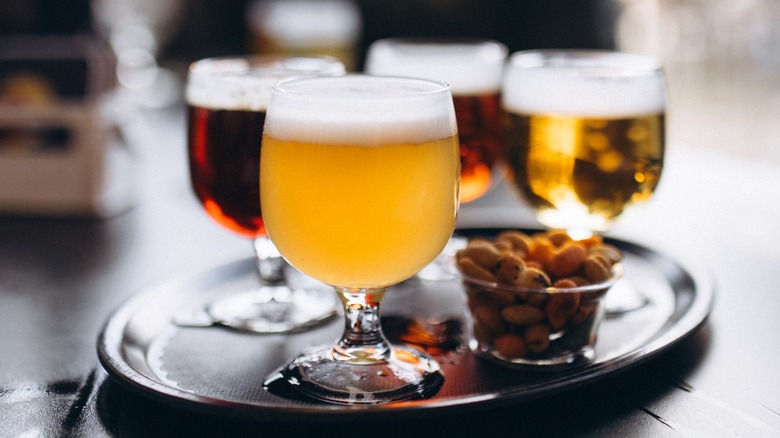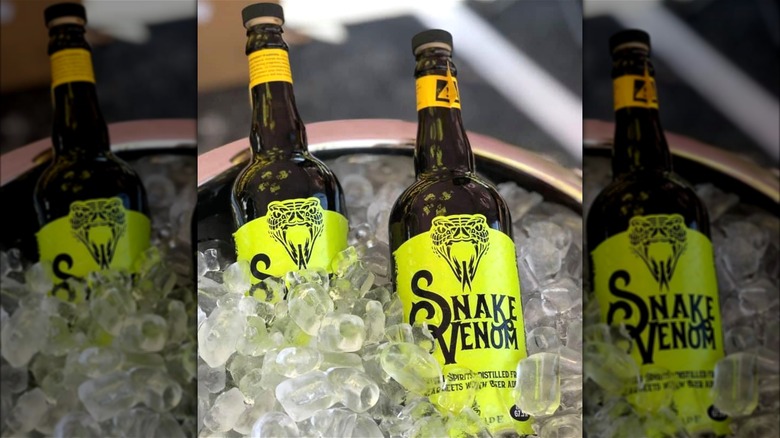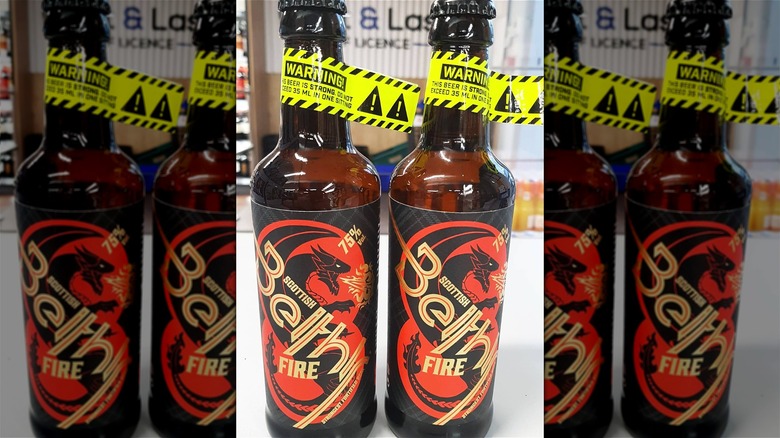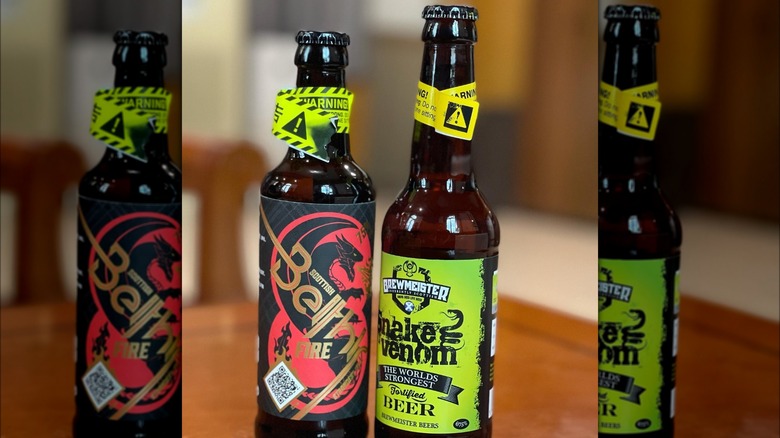The Beers With The Highest ABVs In The World Come With Warning Labels
It may be pretty obvious, but there are many variations of beer out there. Over the years — and especially in recent decades with the proliferation of the craft brewing industry — it's become more and more likely to find a beer to match just about anyone's taste. You can think about this in terms of the flavor and body of a particular beer, but you can also make distinctions based on the strength of the beer in question. Most commonplace beers are going to sit around 4% to 5% ABV (alcohol by volume). Some can skew lighter, while others, as you'll see, can get much stronger.
If a beer sits at above 5.6% ABV, it can be considered a strong beer — a distinction made by the alcohol content rather than a qualitative flavor. Once you hit 8.6% ABV, you can call your beer extra-strong. But two breweries in Scotland have produced products that dwarf this already-considerable number. Snake Venom, from Aberdeenshire-based Brewmeister brewery, clocks in at a staggering 67.5% ABV. And, not to be outdone, Beithir Fire, produced by Edinburgh's 88 Brewery, has a nigh-inconceivable 75% ABV. It should surprise no one then that both beers come with a bright yellow warning label advising against consumption over 35 milliliters (about one shot). Indeed, much like how the world's strongest alcohol is too dangerous to drink neat, you really ought to be careful with these beverages when (or if) you choose to imbibe.
Snake Venom packs a punch
Aside from the standard process of brewing beer, Brewmeister has to add a few more key steps in order to make a beer with such a heavy concentration of alcohol. The brewed product itself uses two varieties of yeast as well as smoked peated malt (Peat gives whisk(e)y its smoky flavor). Champagne is also added to the mix, so the core ingredients, while perhaps somewhat unconventional, are nothing too off-base. However, once the brewing process is complete and fortification begins, Snake Venom starts to become a true beast of a beer.
Snake Venom is strengthened in two processes. The first, and likely lengthiest, is a repeated method by which the beer is frozen in order to remove ice crystals from it, thus concentrating the flavor and potency. The already strong beer is then fortified with yet more alcohol to bump its ABV up to its frankly-absurd level. This second technique is similar to how fortified wine (such as vermouth) is made stronger. But Snake Venom takes it to another realm entirely by adding alcohol instead of another spirit. The final product then awaits anyone brave or foolhardy enough to give it a shot. A bottle isn't cheap, sitting at roughly $63 depending where you live, but it's available for consumption if you feel up to the task. Just don't forget the warning label!
Beithir Fire is a burning blend
Much like its Scottish counterpart, 88 Brewery also needs to do a little bit of finagling to bump its beer up to the astounding 75% ABV that warrants the eye-catching warning label. However, unlike Snake Venom, which combines its beer ingredients for maturation before fortifying it, Beithir Fire takes a slightly different approach. The resulting product is a beer that truly brings the heat and stretches the boundaries of what can even be called "beer" to begin with.
Beithir Fire begins its life with a short two-month stint of being brewed as a Scottish barley ale, with extra yeast, sweet barley, and hops added throughout. From there though, it begins to take form as the Beithir Fire that you purchase, becoming a strong combination of what 88 Brewery calls "Scotland's most famous products: beer and distilled spirits." While Scotch whisky isn't confirmed to be the distilled spirit in question, it's certainly implied in both the brewing process as well as the signature taste profile. Once the beer and spirit have been blended to hit the desired 75% ABV target, the mixture is then fermented prior to being filtered three times to create a pure (but still very potent) finished beverage. With a price point roughly equal to Snake Venom, plus limited availability, obtaining Beithir Fire might require a bit of digging. Still, it's by no means impossible to find if you're searching for a truly challenging 35 milliliter drink.
These beers are strong, but are they any good?
It's fine and dandy to lay claim to being one of the strongest beers in the world, but how much is that worth if the beers themselves aren't up to snuff? While Snake Venom and Beithir Fire are certainly going to be limited in flavor by the sheer alcohol content, there are still some tasty elements at play, especially when you remember the core ingredients behind the brewing processes. So what can you expect when you pour a glass of these heavyweight beers?
First off, let's cover the glass. The type of glass you use for beer is important, but all are too large for the comparatively tiny serving size for these beers. Brewmeister ships a small, Glencairn-esque glass with each bottle of Snake Venom, a vessel you can also use to enjoy Beithir Fire. Both beers have a dark, amber hue, and have no carbonated head by virtue of their thick, liquor-like composition. Flavor-wise, both feature an abrasive, potent burn from the alcohol which eventually gives way to some more subtle flavors. Snake Venom reportedly contains notes of malt and caramel, while Beithir Fire is said to contain a sweeter profile with hints of butterscotch. Still, much of these flavors are only evident after overcoming a rather strenuous experience regarding that first sip. But if you're looking for a novelty beer that demands to be treated more like a spirit to be shared, then Snake Venom or Beithir Fire might be worth the search.



